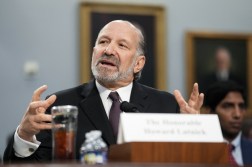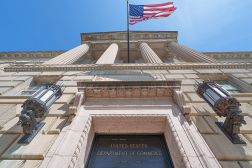Good signs for federal IT under Trump, Rep. Will Hurd says

The Trump administration’s transition teams are asking “all the questions” that the House Oversight and Government Reform Committee has been asking for the last two years around IT, said Rep. Will Hurd in an interview with FedScoop.
During a chat with FedScoop at the SXSW Conference in Austin, the Texas Republican was optimistic about the future of government information technology and cybersecurity under a Trump administration. As chairman of the Subcommittee on Information Technology, Hurd has been pushing agencies to modernize their out-of-date and still aging IT systems.
Last Congress he introduced the Modernizing Government Technology Act to try to facilitate that. It passed the House but stalled in the Senate, and Hurd has said he plans to reintroduce the legislation.
It’s “a really good thing,” that the transition teams are asking these kinds of questions around IT, Hurd said. Speaking to an audience of technologists and other conference attendees earlier in the day, he gave examples.
“Like: ‘Why are there 14 [chief information officers] within this agency?’ Or: ‘How come the CIO doesn’t report directly to the agency head?'” Hurd said. “So those kinds of conversations are going on. And trying to figure out how do you do a mass migration to the cloud.”
The topic for the panel was open data, but the conversation turned often to IT modernization, and steps Congress and agencies should be taking to ensure government is efficient and can capitalize on innovative private sector solutions.
“These are all steps in the right direction to improve access to data, and in making sure we’re collecting the right data, so we can use it to drive decisions and innovation,” Hurd said.
In an interview with FedScoop after the panel discussion, Hurd elaborated that “the buck stops with the agency heads.”
“If the agency head says this is important, then that’s going to help with any food fights within the organization,” he continued. “And I have no perspective how this started under the Obama administration when he first came into office, but the fact that these critical questions have been asked from day one, under Trump, is a great sign that this is going to be a priority. And leaders of these agencies are going to be held accountable to get this done.”
He also added that he believes the Trump team recognizes that cybersecurity and efficiency are C-suite issues. Indeed, the Trump team is purportedly finishing up an executive order around cybersecurity, and a White House official told press that it would include a nod to IT modernization.
“I think we’re going to get some new leadership in, we’re going to get people paying attention to this from the very beginning,” Hurd said. “And so as you’re coming in and learning a new organization and establishing principles it’s baked into the direction of the organization from the beginning under this new administration. And I think that’s going to be a good thing.”
He added that it’s important, too, that these conversations are happening before “the people running the show” are in place. Trump has not yet appointed a U.S. federal chief information officer, for example, or a chief information security officer. Many agency heads are also not yet named.
But by having the conversations before things really get started, Hurd said, “you’re not having to break any inertia from having been doing something a [certain] way from the beginning.”
When it comes to driving federal IT improvements, Hurd mused that the “grand architect” may change.
“I would say over the past two years it’s been Tony Scott, the federal CIO. I could see this being somebody else in the White House. I mean I don’t know,” he said. “The federal CIO role is still going to be important, but you may have more people involved in driving that policy.”
Mentioning too the Obama-launched innovation group 18F, Hurd noted that the White House and others have shown interest in that office and others.
“There were a lot of questions if these initiatives that were started under Obama are going to continue, right?” he said, but answered: “We’ve been zigging, we’re not going to zag.”






